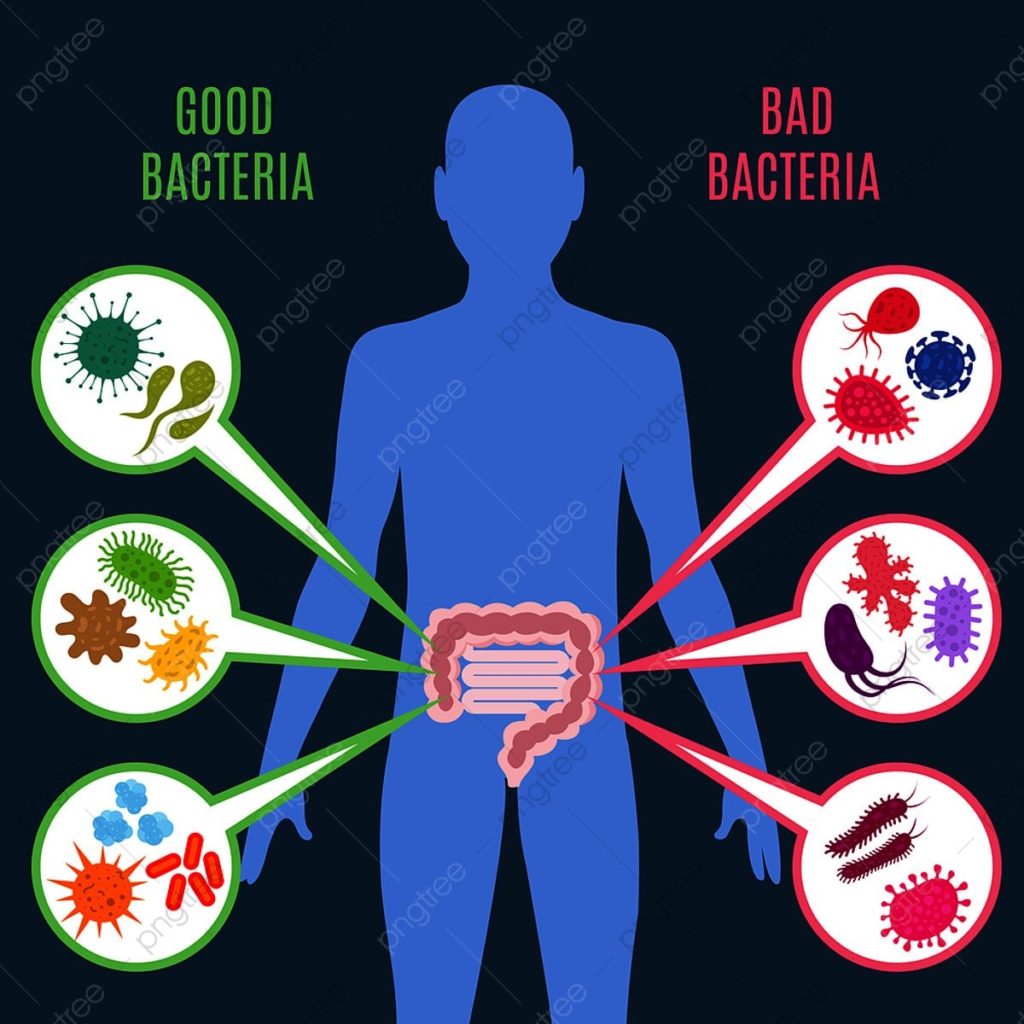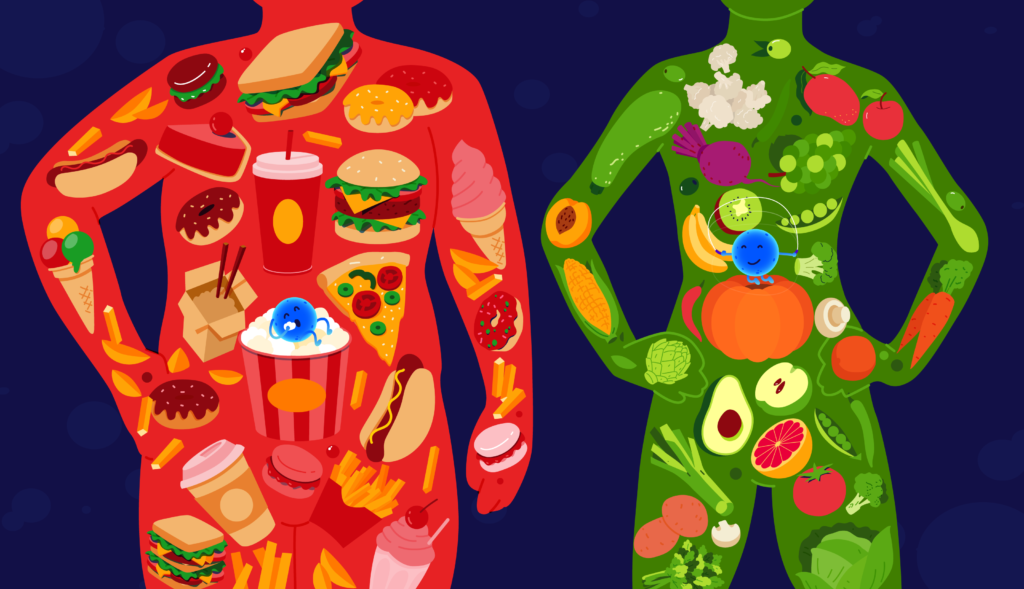Nowadays, we see a lot of people facing gut issues but not all take it seriously. Importance of Gut Health is not given value unless you face the consequences of having poor gut and associated health issues. Earlier it was associated mostly with age, obesity or any Gastrointestinal disorders because we ate more of home cooked food. But today, young kids and teenagers also face gut related problems like acidity, reflux, constipation, gas, and bloating.
Gut is the main organ of our body as maximum digestion and absorption of nutrients takes place in the gut. Unhealthy gut means there is malabsorption of nutrients so there is very less possibility of indigestion. If gut issues are persistent then there is high risk of nutritional deficiencies because of which our body might show many symptoms like low Hb, Low Vit B12, Low energy levels etc.
It is very important to understand the cause first so we can prevent gut from any sort of disorders and give a right treatment or help to the gut.
Importance of your gut microbiome

Healthy gut are integral to human life and carry out various vital functions such as playing a role in digestion, metabolism and inflammation. As an infant, your gut microbiome helps develop your gut immune system, and then as an adult, it helps to maintain those microbiomes. It also helps humans to absorb nutrients. Gut bacteria help the body to break down complex molecules into smaller particles which can be absorbed by the gut. Hence Gut health is an important element of your overall physical and mental health.
Let us see what can harm our gut.
6 signs of an Unhealthy Gut
- Constipation
- Diarrhea
- Fatigue
- Acid reflux
- Irregular Motions
- Less Sleep
- IBS
- Hormonal imbalance
- Inflammation
- Nutrient Deficiencies
How to improve your gut microbiome
These gut microbes influence energy metabolism by regulating glucose metabolism, appetite, and fat storage composition. It is seen that bacteria in the gut were different in obese people than in people who were non-obese. Beneficial gut microbes are happy to trade plant-based foods and healthy fats for their health. Rainbow plant foods contain many different phytonutrients, like polyphenols, that help the body prevent free radical damage and inflammation. They also contain a variety of fibers for gut health.

Your healthy bacteria help you to:
- Digest food
- Protect against pathogens, such as viruses
- Provide essential nutrients, enzymes and hormones
- Manage your metabolism
- Train your immune system
But they can only do all this if your microbiome is in balance. Every gut microbiome is unique and an individual’s genetics and environment both contribute to it. So, if you want to be healthy, it’s really very important that your microbiome is healthy and that the microbes in it are in balance with one another.
HOW TO IMPROVE YOUR GUT HEALTH
1. Add Color to your Diet
“Eat the rainbow” is a fundamental healthy gut eating tip. It contains, the variety of vitamins, minerals, antioxidants, and phytochemicals in fruits and vegetables may be more powerful for your gut health than any pill. Different colors mean different vitamins and minerals present in them. More the colors in your diet, more is the vitamins and minerals present
2. Add fiber to your diet
High fiber food has a positive impact on gut health. particularly in vegetables, fruits, beans, and whole grains, fiber helps keep your bowel movement regular.
3. Eat Probiotic Foods
Probiotics are known as “friendly bacteria.” Good
sources of probiotics are found in curd, yogurt. They help introduce good bacteria into your gut microbiome and also helps to ease symptoms of constipation, gas, stomach pain, IBS etc
4. Drink Enough Water
Drink adequate water to support gut health. Enzymes, stomach acids, hormones work more efficiently if there is good hydration in the body.
5. Get Enough Sleep
Rest is equally important as it is a Reset mode for your gut system. It’s the time that the body heals. So less or irregular sleep will definitely trouble your gut.
6. Eat Regular Meals
Do not skip meals. Listen to your body and feed when required. What you feed is equally important.
7. Involve in Physical Activity
Any type of exercise or activity helps in the physical mobility of the digestive system. This helps in improving gut health.

Worst Foods for Gut Health
- Processed and Refined Foods.
“Processed foods”as a whole because each food has different ingredients, but the biggest issue with processed and refined foods is that they lack diversity and fiber and are often filled with added sugars, trans fats, salt, artificial sweeteners and/or additives and preservatives. - Artificial Sweeteners.
A diet high in sugar can stimulate the growth of certain unhealthy bacteria in the gutwhich may contribute to weight gain and other inflammatory chronic health disorders. - High Trans fat food
Trans fats are a form of unsaturated fat, either natural or artificial. Higher consumption of Trans fatty acid is a risk factor for several inflammatory diseases including inflammatory bowel disease, and can cause several effects on human health, including cardiovascular disease, diabetes, and cancer. Always read the label, look if it has trans fat or hydrogenated fat. Any fat ingredient which is mentioned as Hydrogenated is Trans Fat.
Taking care of the gut is not that difficult if you follow the rules of a healthy lifestyle. If you feel you need guidance for the same, you can reach out to us via mail or Whatsapp.
Services Provided By Us:
Online Consultations
Offline Consultations
Webinars
Health Talks
RD Neha Kava
Latest posts by RD Neha Kava (see all)
- Your Fitness Bucket List for 2024 - July 26, 2024
- 7 Home Workout Exercises for Stay-at-home Moms - July 25, 2024
- 7 Health Supplements Every Man Should Take - July 23, 2024



